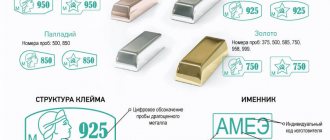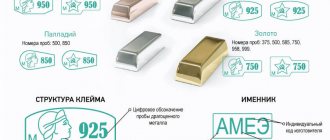Registration for special registration with the Assay Office
The responsibility of the State Assay Office is to control the turnover of precious metals and stones.
Each company or individual entrepreneur that processes or sells precious stones and metals in their work must register with the Assay Office. An appropriate license must be obtained. All the rules by which registration is carried out with the Assay Chamber are described in Article 13 of Federal Law No. 41 “On Precious Metals and Precious Stones”, adopted on March 26, 1998. The law states that all enterprises, of any organizational and legal form, as well as individual entrepreneurs that sell, produce, process and process, use, buy and trade, use as exhibits for exhibitions, accept as collateral must register with a special register. precious metals and precious stones and things made from them.
The goals of such work can be different and relate to medicine, science, study, military affairs, etc. The number of organizations that must register includes banks, educational organizations, companies; clinics where threads made of precious metals are used and many others.
You can register with the Assay Office if you have a certain list of documents:
- passports;
- a certificate confirming that the company or individual entrepreneur is a member of the Unified State Register of Legal Entities or the Unified State Register of Individual Entrepreneurs and notifications, as well as extracts from these registers;
- notifications that the company is registered with the tax office;
- Rosstat codes;
- an agreement to confirm the lease of non-residential premises, or a certificate confirming that the applicant is the owner of the premises.
You need the originals of all documents, as well as their notarized copies. Registration as a rule takes no more than ten days.
Based on the results, a certificate is issued that confirms that the enterprise or individual entrepreneur has been put on special accounting. Also included is a registration card with the Assay Office.
Registration in GIIS DMDK. Personal experience.
Until September 1
all participants in the jewelry market
who are specially registered with the Federal Assay Chamber
must register in
the State Integrated Information System in the field of control over the circulation of precious metals and precious stones (
GIIS DMDK
).
As with any government system, the GIIS DMDK is subject to increased security measures. It is necessary to obtain a qualified electronic digital signature that works with GIIS DMDK and establish a secure connection. The registration process is not always quick and painless
.
We want to share with you the experience of successful registration
in GIIS DMDK of our good partners (trade mark “Vesna jewelry”).
General Director of Primavera LLC Roman Sukhanov
tells which stages of registration in the GIIS DMDK caused the greatest difficulties.
“At the beginning of July, we began the registration procedure in the GIIS DMDK. We decided to register in advance so as not to fall out of the legal field due to any errors (in the absence of registration in the GIIS DMDK, from 09/01/2021 it is prohibited to work with precious metals and products made from them).
First of all, we checked all our digital signatures and none of them were suitable for the GIIS DMDK. The question arose: where to get it. When searching for a certification center that can issue such digital signatures, it turned out:
1. Digital signatures issued by
the Federal Tax Service of the Russian Federation are currently not suitable for GIIS DMDK, as they have a short validity period.
Interdepartmental coordination is currently underway, it is unknown when it will take place, so this option is immediately eliminated. 2. The only certification center that issued an electronic digital signature suitable for GIIS DMDK was ITCom LLC.
Kontur and Tensor promised to begin issuing suitable digital signatures only at the end of July.*
*Starting July 26, companies began issuing digital signatures for GIIS DMDK.
We decided to order an electronic signature from
ITCom LLC through the website ecp-shop.ru .
The ordering procedure is not complicated, you fill out the fields, attach scans of title documents and sign with your existing digital signature. You can, of course, bring the originals, but this was not suitable for us due to the distance of the ITCom company from us. Our current digital signature for financial monitoring from Contour was suitable for certification. We received notification of the signature release on July 7, followed the link in the email and recorded the digital signature on our flash drive.
The next day we set up the workplace.
We had already installed CryptoPro earlier (it was required for financial monitoring and sending financial statements), additionally installed plugins posted on the GIIS DMDK , and configured certificates. For all settings, the instructions located on the GIIS DMDK . The browser used was Sputnik with cryptography support.
The instructions are clear and clear; if you follow their algorithm, there will be no problems or difficulties with registration.
On the third day, we covered ourselves with documents and started registering on the GIIS DMDK portal.
Why did you use your digital signature to log into your personal account on the system operator’s website and perform the following steps in sequence:
1. The general director registered.
2. Created and linked an organization to your account.
3. At the end of the day, the first application for special registration was sent to GIIS DMDK.
After 3 days, we received a reasoned refusal from the regulator indicating the reasons.
The mistakes were common:
did not indicate all types of activities (there were only 3 of them: the main one and 2 additional ones, and we have more than 10), did not attach a scan of the lease agreement for the premises where we carry out activities in our personal account and did not register the auxiliary unit located at a different address, because the program does not allow you to create several units with the same checkpoint.
According to the rental agreement, the problem was resolved quickly - they attached a scan
. By the way, now the system will no longer allow you to send an application without attaching documents; the developers have eliminated the possibility of this error.
By type of activity, the problem took much longer to resolve
. Only at the webinar in ZOOM, which was conducted by representatives of the regulator, we were told that the program provides for 1 main type and 2 additional ones, all subsequent types of OKVED must be entered with the status “Other”. We did not know this subtlety and initially indicated only the main type and two additional ones (the system did not allow us to enter more).
Transmission problem
We discussed with representatives of the regulator and came to the conclusion that the easiest way would be to add a second address to real estate. Now we have the address of the main production and auxiliary production there (there is no need to set up a checkpoint, and since our main and auxiliary production are located in the same tax office, they have one checkpoint).
There is another option to solve the problem with the checkpoint, but it is a little longer and labor-intensive: you need to register it with the tax office as a separate division, then the Federal Tax Service will assign its checkpoint to this unit.
Having corrected all the errors and learned all the options for solving software difficulties, on July 26 we re-submitted the application for registration. After 2 days, we received a new notice - in the lease agreement, the address of the auxiliary production indicated a letter near the building, but in the application the letters were not indicated. But this is purely our mistake. On the same day, we sent an application for the third time and the next day, July 29, we received a notification of registration with the GIIS DMDK.
After completing the registration procedure, the inscription “On special registration” appeared in the company’s header and now we have access to an application for registering a personal name, which we are going to do in the near future. We'll start by re-registering the name for this year, and then we'll try to issue a receipt for testing in the system, because... There is very little time left for paper receipts to live, everything is going digital.
In conclusion, we will indicate the most common errors and difficulties during registration.
When filling out various forms, the question arose about the validity period of unlimited documents. We put it on 12/01/2038, some put it on 12/31/2049.
Perhaps the program will be improved and it will be possible to choose the validity period of documents indefinitely, but for now choose the maximum possible year.
The program provides for 1 main OKVED and 2 additional ones; all the following types of activities must be entered with the status “Other”.
If there are several divisions with the same checkpoint in the special accounting map, then it can be entered on the real estate tab, and not on the separate divisions tab
. Because if a division is registered at the tax office as separate, and not just at the assay office, then it will have a different checkpoint. For example, we have KPP 440101001, if we had registered the auxiliary production with the Kostroma tax office as a separate separate division in terms of the tax code, then it would have been assigned KPP 440101002.
It is worth noting the professionalism and understanding of the employees of the Assay Inspectorate, who are ready to help and suggest how to correct comments that did not allow registration in the GIIS DMDK system.
Follow the instructions, ask questions and you will be able to successfully register in the GIIS DMDK system and legally work after September 1, 2021.
”
Assay Office License
A license is a document confirming that an enterprise or individual entrepreneur has been specially registered with the Assay Office. Such a license is required by organizations or individual entrepreneurs whose type of activity is specified by law.
A jewelry license is issued when the production is carried out, if the enterprise or individual entrepreneur is engaged in the manufacture of jewelry or trades in it. Staging is necessary for everyone who produces jewelry, stores it and sells it.
Online stores and teleshops must also register. They need to obtain a license and have a safe deposit box rental agreement. Registration is possible with the obligatory provision of copies of constituent documents.
Pawn shops also require a jewelry license. Such an enterprise can only be opened in the form of an LLC. A jewelry license is required if a company or individual entrepreneur buys jewelry or its scrap, as well as scrap of other products made of precious metals and stones.
The production of goods from precious stones and metals and the processing of these materials also requires registration with the Assay Office.
Registration of personal names
Register of registered names for 2021
What is a name tag?
A name tag is a manufacturer’s mark that is affixed by a legal entity or individual entrepreneur on the products they produce.
The nameplate is enclosed in a single contour, all namesakes undergo annual registration/re-registration in the territorial bodies (divisions of territorial bodies) of the Federal Assay Chamber. Different manufacturers cannot have two identical names.
Do you want to start making jewelry? – receive the name code (pP 1127). What needs to be done for this?
- Register with a special account of a legal entity or individual entrepreneur carrying out transactions with precious metals and precious stones;
- Submit to the territorial body of the Federal Assay Office, in the area of activity of which the production (workshop for production) of jewelry is located, a copy of the notice of special registration, an application for registration (re-registration) of the name holder;
- Make a name card with an assigned code;
- Pay the state fee for registration (re-registration) of the name;
- Put the name stamp on the polished plate;
- Attach the plate with the name to the application in two copies (one copy of the registration application, with the attached plate, is returned to the applicant after the registration mark, the second copy remains in the territorial body of the Federal Assay Chamber) along with a document confirming payment of the state fee for registration (re-registration ) submit the name to the territorial body of the Federal Assay Office.
The name is valid for the calendar year in which it was registered. Upon expiration of the validity period, the name card must be destroyed by the manufacturer, while information about the name card remains in the register (list) of names.
What information does the name plate contain?
The namebook contains encrypted information about the year of manufacture of the product, the territorial body (division of the territorial body) of the Federal Assay Office in which the manufacturer is registered and the manufacturer of the product. For example:
1. Name stamped mechanically:
2. Name plate affixed using the electric spark method:
From 2001 to the present, the following order of designation of the code in the name plate has been established: the first character is a letter of the Russian alphabet, indicating the year of manufacture of the product.
| Year | Letter | Year | Letter |
| 2001 | A | 2011 | M |
| 2002 | B | 2012 | N |
| 2003 | IN | 2013 | ABOUT |
| 2004 | G | 2014 | P |
| 2005 | D | 2015 | R |
| 2006 | E | 2016 | WITH |
| 2007 | Z | 2017 | T |
| 2008 | AND | 2018 | U |
| 2009 | TO | 2019 | F |
| 2010 | L | 2020 | X |
The second character corresponds to the code of the territorial body (division of the territorial body) of the Federal Assay Office, in which the manufacturer registered the name.
| No. by order | Name of the territorial body (division of the territorial body) of the Federal Assay Chamber | Code of the territorial body (division of the territorial body) of the Federal Assay Office in the main hallmarks |
| 1 | Verkhne-Volzhskoe MRU of the Assay Chamber of Russia for the Central Federal District | IN |
| 2 | MRU of the Assay Chamber of Russia for the Volga Federal District | G |
| 3 | MRU of the Assay Chamber of Russia for the Siberian Federal District | I |
| 4 | MRU of the Assay Chamber of Russia for the Far Eastern Federal District (Khabarovsk) | YU |
| 5 | MRU of the Assay Chamber of Russia for the Southern Federal District (Rostov-on-Don) | TO |
| 6 | MRU of the Assay Chamber of Russia for the Northwestern Federal District (subdivision of Kaliningrad) | F |
| 7 | MRU of the Assay Chamber of Russia for the Far Eastern Federal District (subdivision of Ulan-Ude) | AND |
| 8 | MRU of the Assay Chamber of Russia for the Siberian Federal District (division of Novosibirsk) | N |
| 9 | MRU of the Assay Chamber of Russia for the Volga Federal District (subdivision of Ufa) | P |
| 10 | MRU of the Assay Chamber of Russia for the North Caucasus Federal District | Z |
| 11 | MRU of the Assay Chamber of Russia for the Far Eastern Federal District (subdivision of Yakutsk) | D |
| 12 | MRU of the Assay Chamber of Russia for the Northwestern Federal District (subdivision of Veliky Ustyug) | A |
| 13 | MRU of the Assay Chamber of Russia for the Northwestern Federal District | L |
| 14 | MRU of the Assay Chamber of Russia for the Ural Federal District | WITH |
| 15 | MRU of the Assay Chamber of Russia for the Central Federal District | M |
| B | ||
| 16 | MRU of the Assay Chamber of Russia for the Central Federal District (division of Orel) | ABOUT |
| 17 | MRU of the Assay Chamber of Russia for the Volga Federal District (subdivision of Saratov) | R |
| 18 | MRU of the Assay Chamber of Russia for the Southern Federal District (Simferopol) | T |
After the year of manufacture and the hallmark inspection code, the manufacturer’s code is indicated in the nameplate, usually consisting of a combination of 2 letters.
The Federal Assay Office maintains a register (Order of the Ministry of Finance 174) of registered names of manufacturers of jewelry and other products made of precious metals.
On which product will you not find a name tag?
The name tag may be missing on foreign-made products. In fact, the absence of a name indicates that the product was imported into the territory of the Russian Federation.
Do you have one or more products? Need some repairs done? Make something new out of several products?
When receiving your order, do not forget to check the presence of the master’s name stamp and the state hallmark stamp on the product.
What is the amount of the state duty for registration (re-registration) of a personal name?
Initial registration of a name - 600 rubles, annual re-registration - 400 rubles.
Problems with the address
Registering a new company today is not difficult. You just need to prepare a package of documents, fill it out correctly (on your own or with the help of a law firm that provides similar services) and submit it to the tax office in a timely manner. All the main problems begin after registration - when the company becomes a full-fledged market player.
Nevertheless, there is one point that, as a rule, causes difficulty even at the stage of registering a company: the newly created company does not have an office (and, accordingly, a legal address). Renting a room is an expensive pleasure. And the prospect of saving on rent (until things get going and the company exists only on paper) is very tempting. Therefore, when starting to register a company, an entrepreneur, as a rule, does not even imagine where it will be located. At the same time, the package of documents for registering a company in the form of OJSC, CJSC and LLC (the lucky exception is the registration of an individual entrepreneur) includes the mandatory submission of a legal address (the official location of the company’s office). What should I do? There are two options: purchase a temporary legal address or register a company at the home address of one of the founders. Both options are not controversial.
Purchasing a temporary address is nothing more than concluding a lease agreement. The remaining options for interaction with the owner of non-residential premises - free use or the creation of a fictitious simple partnership - have more disadvantages than advantages. Instead of simplifying a businessman’s life, they can make it significantly more difficult. For example, the creation of a simple partnership involves conducting joint commercial activities. This means that the businessman and the office owner must regularly submit accounting reports on this joint activity to the tax office. And, despite the fact that joint activities are carried out virtually, only on paper, it will be quite possible to spend time preparing papers and paying accountants for their work.
The cost of a legal address ranges from 8 to 90 thousand rubles. By purchasing an address at the minimum price, an entrepreneur risks getting “roommates” - unscrupulous owners of non-residential premises can sell the same square meters to several businessmen at the same time. In addition, there are premises that are resold dozens of times even by non-owners. Criminals, having taken possession of the seal and forms, make copies of documents, put seal impressions on blank sheets and offer offices at a low price to budding entrepreneurs. Tax inspectorates have long had “blacklists” of such offices. It is clear that registration of a company with a fake legal address is denied, but the unlucky entrepreneur can no longer return the money paid for office rent. But even if an entrepreneur is lucky and a legal address purchased at a “reasonable price” is successfully registered with the tax office, no one guarantees the absence of problems. Let's imagine a very common situation: a tax inspector decided to check the location of a company. Of course, the address of the company in question is not visible at the address indicated in the documents. This means that troubles cannot be avoided.
Expensive addresses are a completely different matter. These are real premises that the owner rents out on completely legal grounds and officially receives a profit. The concluded agreement provides for the right of the tenant to receive correspondence at the legal address (or information that the correspondence has arrived and can be picked up), pay rent by bank transfer (which means the accountant will be able to include these amounts as expenses). As a rule, the tenant company can stay for one or two days in the rented premises (during the tax audit), thus confirming its presence at the stated address and avoiding trouble.
“We must admit: even expensive addresses do not save businessmen from headaches, since they will not be able to stay “long and forever” in a rented premises, even waving a legal lease agreement over their heads,” notes Alexander MOSKALEV. “Therefore, we always recommend that our clients indicate when registering, real addresses. That is, the address where the company’s office will actually be located. If this is not possible, in order not to waste time, it is better to register at the home address of one of the founders, and immediately after the company has decided on the location of the office, re-register.”
The second option is to register a company at your home address.
Recently, there has been more and more insistence that registering a company at the home address of the founder (director) is illegal and therefore impossible. Is it so?
Alexander MOSKALEV says : “Our practice says the opposite. We quite often help register new companies at their home address. There are two aspects to this question, two approaches. First: according to the Housing Code, residential premises are intended only for living. Production cannot be located in residential premises. Since the provision of services presupposes their production, the Housing Code accordingly prohibits opening a company providing services in a residential premises (in an apartment). Second approach: The Labor Code of the Russian Federation provides for the opportunity to work from home. This means that the director of the company has every right to work from home. And the registration address of a company is nothing more than the location of the director of this company. I draw your attention: not the place of production of products, not the place of provision of services, not the place of sale of certain products (in our case, jewelry), but the location of the executive body of the company - the director. The territory where inspection services can find the head of the company. This means that the home address can legally be used to register a company. Where the store will be located is another question.”
If the tax office still refuses to register a company at your home address, what should you do: appeal its decision in court?
“As our experience shows, a refusal can come if the application for registration falls into the hands of a not very competent and not very experienced tax officer (from this, you understand, no one is immune),” answers Alexander MOKSALEV . – In this case, it’s better to just re-submit the documents and hope that this time you’ll be lucky with the inspector. The fact is that a judicial appeal will take at least 90 days, and only five days will be considered for registration documents.”
There is another problem related to the legal address. Often, owners of non-residential premises, when signing lease agreements, note that this agreement is not the basis for registering a company at its location. Some do not want their address to appear in the Unified State Register of Legal Entities. Others simply make money from this: they ask to pay 30 thousand rubles to exclude this wording from the contract. What to do in this case? It is best, of course, to track this maneuver before signing the documents. If the location of the future office is completely satisfactory, the contract is already at the signing stage and in all other points you are completely satisfied - it is easier to pay the required amount (hurriedly buying a legal address is more expensive, more troublesome and less reliable, as mentioned above).
Registration with the Federal Assay ChamberOrganizations and entrepreneurs in the jewelry sector, as well as jewelry pawnshops, are required to register with the Federal Assay Office before starting operations with precious metals, stones, and jewelry made from them.
For many years, we have successfully provided services for special registration with the Federal Assay Chamber of organizations and individual entrepreneurs carrying out transactions with precious metals and precious stones.
— How can we help?
— Cost of our services
— Typical questions related to the special registration procedure
we can help.
Despite the seemingly simple procedure for registering for special registration, jewelers and pawnshops often encounter registration refusals. Don't believe me? Try it yourself and you will see how easy it is to make mistakes and have your documents refused to be registered.
We will help you collect, fill out and execute all the necessary documents to register your organization with a special register in the Assay Office.
We organize the submission of documents to the MRU of the Federal Assay Office and their receipt from registration (often department employees do not send documents by mail, offering applicants to receive them in person).
After special registration with the Federal Assay Chamber, you will be given a notice of special registration and a special registration card certified by the Assay Chamber (if you requested a copy of it).
the cost of our services.
Preparation of a turnkey package of documents (filling out an application and a special registration card) for registration with the Federal Assay Office is approximately 6,000 rubles
for small business representatives.
In the event that you register with the MRU of the Federal Assay Office, located in Moscow, and you need express submission and receipt of registration documents by representatives of our company, this service costs 4,000 rubles
. You can save on this service by receiving the documents yourself. We will advise you on how this can be done.
To order a service, please contact us by phone:
+7 (903) 686 3187
+7 (964) 768 9380 (multi-channel)
Our email address:
Please note that commercial offers on our website do not constitute a public offer.
some typical questions related to the procedure for special registration with the Assay Chamber
Who is eligible?
Legal entities and individual entrepreneurs carrying out transactions with precious metals and precious stones (hereinafter referred to as legal entities and individual entrepreneurs) are subject to special registration, with the exceptions listed in clause 2 of the Government of the Russian Federation of October 1, 2015 No. 1052 “On conducting special accounting of legal entities and individual entrepreneurs carrying out transactions with precious metals and precious stones" (together with the "Rules for maintaining special accounting of legal entities and individual entrepreneurs carrying out transactions with precious metals and precious stones").
Do pawnshops undergo special registration with the Assay Office?
If a pawnshop carries out transactions with precious metals and precious stones, such a pawnshop must be specially registered with the Federal Assay Office.
Who registers?
Special registration is carried out by the Federal Assay Chamber.
Deadlines for special registration?
Legal entities and individual entrepreneurs are subject to special registration within 30 calendar days from the date of their state registration (when declaring codes according to the All-Russian Classifier of Economic Activities related to the production, processing and circulation of precious metals and precious stones) or making appropriate changes to their constituent documents.
What documents are needed for special registration with the State Property Inspectorate?
In order to register for special registration, legal entities and individual entrepreneurs submit the following documents to the authorized body:
a) an application for special registration in any form, signed by the head of a legal entity or an individual entrepreneur;
b) a special accounting card in the form approved by the Ministry of Finance of the Russian Federation.
The specified documents are submitted to the authorized body directly or sent by registered mail with return receipt requested or in the manner determined by the Ministry of Finance of the Russian Federation, in the form of an electronic document.
What is the period for consideration of applications for special registration in the FPP?
The MRU of the Federal Assay Chamber makes a decision to register a legal entity or individual entrepreneur with special registration and assign it an account number, or a decision to refuse to register a legal entity or individual entrepreneur with special registration within a period not exceeding 15 calendar days from the date of receipt of the documents.
What should I do if the information contained in the special registration card has changed (address, director, name, passport details, etc.)?
When changing the information contained in the special registration card, legal entities and individual entrepreneurs, within 5 working days, submit to the authorized body an application in any form to make appropriate changes to the special registration card, signed by the head of the legal entity or individual entrepreneur, as well as the special registration card containing new information.
Is it necessary to submit a modified form of a special registration card to the Federal Assay Office if we were registered using an old card, and now a new modified form has been issued?
The new form of special registration card will be used by those organizations and entrepreneurs who are currently registering for special registration. If you have not made any changes to the account information contained in your existing card, you do not need to fill out a new one.
How to remove yourself from special registration at the Federal Assay Office?
When ceasing operations with precious metals and precious stones, a legal entity or individual entrepreneur sends to the authorized body in a free form an application for deregistration from special registration, signed by an authorized person of the legal entity, individual entrepreneur or his authorized representative.
We recommend that you attach (hand in) a special accounting card to your application in a form approved by the Ministry of Finance of the Russian Federation.
Also, after deregistration with the Federal Assay Office, we recommend writing a letter to Rosfinmonitoring with a request to close your personal account. The letter is written in free form and sent to the address 107450 Moscow, st. Myasnitskaya, 39, building 1.
Does the Federal Assay Chamber have the right to remove an organization or entrepreneur from special registration on its own initiative?
Yes, the FPP has such a right. For example, for failure by a legal entity or individual entrepreneur to submit, within 7 calendar days from the date of receipt from the authorized body, a notice of discrepancy between the information contained in the special registration card and the information specified in the Unified State Register of Legal Entities or the Unified State Register of Individual Entrepreneurs, to the authorized body information on the need to make changes to the register of legal entities and individual entrepreneurs carrying out transactions with precious metals and precious stones, or explanations regarding the inconsistency of the specified information, as well as on some other grounds.
Do the requirements of 115-FZ and financial monitoring apply to jewelers and pawnshops??
Necessarily. Internal control rules for AML/CFT/FYR, targeted training, reporting to Rosfinmonitoring, a personal account on the financial monitoring website and much more - all this is necessary for both pawnshops and jewelers. Read more about this here
.
* * *
Check out our many articles on financial monitoring and AML/CFT here:
List of our practical articles and publications on financial monitoring, AML/CFT, anti-money laundering legislation, 115-FZ and other related issues
* * *
Our services in the field of financial monitoring and AML/CFT:
— any documents and rules of internal control (IRAC for AML/CFT);
— training and instruction on financial monitoring;
— audit, subscriber services for AML/CFT;
— electronic signature and special software for financial monitoring;
— assistance during inspections;
- and much more.
More details HERE
.
Subscribe to the “Financial Monitoring Bulletin”
— the first free and regular news release in Russia in the field of financial monitoring:
We are in social networks:
What documents are needed to open a pawnshop?
1. Where to start
2. Approximate list of documents required for registration
3. Approximate list of documents required for work
4. Registration with the Federal Service for Financial Monitoring
5. Registration for special registration in the Assay Office
6. Documents required for registration
7. After registration, the Assay Office issues the following documents
8. Licensing
9. Features
Where to begin
Opening any business begins with writing a business plan. A business plan is a kind of detailed instructions for effective business management, which helps to take into account internal and external risks that negatively affect the company’s activities.
Writing an effective business plan that will correspond to reality and help achieve the company’s goals is quite a labor-intensive task and requires sufficient knowledge in the field of marketing, management, business planning, financial management, etc. Therefore, novice entrepreneurs often turn to companies that professionally develop business plans for help. Most of these analysis groups offer standard business plans for purchase. However, when purchasing a standard business plan, it should be taken into account that different regions have their own specific external environment, different from other regions, which determines market development trends. A typical business plan developed for a project in Moscow is unlikely to correspond to reality when opened in any other region of the country.
Developing a custom business plan has more benefits. Conducting marketing research based on specific conditions and opportunities will most accurately correspond to reality and, as a result, business management will be more effective. Developing a custom business plan can take a long time and require a larger investment, but as a result, you can receive truly actionable instructions that can help you realize your goals.
The next step to carry out business activities is to register a legal entity. The creation of a legal entity is regulated by Chapter 4 of the Civil Code of the Russian Federation, as well as the relevant Federal laws, depending on the chosen organizational and legal form. The most common forms of existence of commercial enterprises are:
- limited liability companies (LLC)
- open joint stock companies (OJSC)
- closed joint stock companies (CJSC).
The choice of the organizational and legal form of the created enterprise is best done in consultation with lawyers. It is also recommended to use the services of law firms to speed up the opening of a legal entity. Many of them provide such a service and will take care of all the routine of registering a legal entity and preparing the relevant documents.
The procedure for registering legal entities is determined by Federal Law No. 129-FZ of August 8, 2001 “On State Registration of Legal Entities and Individual Entrepreneurs.” You can find useful information that will help in the registration process on the website www.nalog.ru. We also recommend that you familiarize yourself with the Federal Law of July 19, 2007 N 196-FZ On Pawnshops (came into force on January 1, 2008).
Approximate list of documents required for registration
- decision (minutes) on the establishment of the Company
- Charter of the Company
- constituent agreement of the Company (if there are several founders)
- application for registration of the Company according to form 13001
- paid state duty – 2000 rubles
- in the future it will be necessary to obtain permission for this type of activity
An approximate list of documents required for work
- Registration certificate
- Title documents for the premises where the enterprise will be located (purchase and sale agreement, lease agreement, etc.)
- Sanitary and epidemiological report with a list of types of work performed and (or) services provided
However, opening a pawnshop is not limited to the standard procedure for state registration of a company and is associated with a number of technical difficulties. Since the pawnshop deals directly with jewelry, which includes precious metals and stones, this means that this organization is subject to registration with a number of government services, namely:
- in the Federal Service for Financial Monitoring (formerly called the Financial Monitoring Committee),
- at the State Assay Supervision Inspectorate of the Russian State Assay Chamber.
The Federal Service for Financial Monitoring (Rosfinmonitoring) is a federal executive body authorized to take measures to combat the legalization (laundering) of proceeds from crime and the financing of terrorism. Interregional departments of the federal service for financial monitoring exist in accordance with the territorial division of the Russian Federation into federal districts.
Assay supervision has operated in Russia as a state system since 1700. The purpose of the assay supervision is to protect the rights of consumers of jewelry and other household products made of precious metals and precious stones, the rights of manufacturers of these products from unfair competition, as well as the protection of state interests in the production, use and circulation of precious metals and precious stones. There are several state assay inspections in accordance with the areas of activity that unite several constituent entities of the Russian Federation.
Registration with the Federal Service for Financial Monitoring
According to the Decree of the Government of the Russian Federation of January 18, 2003 No. 28 on approval of the regulations on registration with the federal service for financial monitoring of organizations carrying out transactions with funds or other property, in the field of activity of which there are no supervisory authorities, registration is subject to, among other things: pawnshops.
An organization is registered within 30 days from the date of its state registration. To register, the organization submits the following documents to the Federal Financial Monitoring Service:
- application for registration (in any form), signed by the head and certified by the seal of the organization; is issued on the company's letterhead.
- registration card in the form approved by the Federal Service for Financial Monitoring (form 2-KPU). Notarized. In paragraph 16 of form 2-KPU, the official responsible for compliance with the internal control rules must have a higher legal or economic education.
The Federal Financial Monitoring Service makes a decision on whether to register or refuse to register an organization within a period not exceeding 10 days from the date of submission of the above documents. Notification of the adoption of the relevant decision is handed over to a representative of the organization against signature or sent by registered mail with return receipt requested.
If the information contained in the registration card changes, the organization reports it to the Federal Financial Monitoring Service within 5 days. Documents for registration can be submitted to the Federal Service for Financial Monitoring by a representative of the organization or sent by registered mail with return receipt requested.
Registration for special registration in the Assay Office
According to the instructions on the procedure for maintaining special records of organizations and individual entrepreneurs carrying out transactions with precious metals and precious stones, organizations, before carrying out operations with precious metals and precious stones, are registered with special records in the state assay supervision inspectorates of the Russian State Assay Chamber in the area of operation of which they passed state registration.
Documents required for registration
- application for special registration;
- a completed special registration card (in two copies) according to the approved form;
- a copy of the state registration certificate;
- a copy of the information letter from the territorial statistics body on registration in the Unified State Register of Enterprises and Organizations (USRPO) with OKVED codes;
- a copy of the certificate of tax registration of the object indicating its identification number (TIN);
- copies of documents indicating ownership of premises for carrying out operations with precious metals and precious stones (on the basis of ownership, operational management, lease, sublease);
- At the same time, applicants submit for review notarized copies of constituent documents (founding agreement and charter or regulations) with additions and changes, which are returned by the State Inspectorate after consideration of the application.
After registration, the Assay Office issues the following documents:
- certificate of special registration (for a period of 5 years, then re-registration);
- a special registration card certified by the state inspection in one copy.
In case of changes, registered organizations and individual entrepreneurs are required to notify the State Inspectorate within 20 days. At the same time, those documents whose data have changed and a new special accounting card in 2 copies must be provided. It is necessary to attach an inventory (in 2 copies) of all documents submitted to the inspection, indicating the number of pages.
If an organization or individual entrepreneur is identified that carries out transactions with precious metals and stones that are not registered, the guilty officials or individual entrepreneurs are brought to administrative responsibility in accordance with the legislation of the Russian Federation.
Thus, registration with the relevant structures is mandatory for pawnshops to fully operate.
Licensing
Federal Law No. 128-FZ dated 08.08.2001 “On licensing of certain types of activities”, which came into force on 11.02.2002, does not provide for licensing of pawnshops.
Peculiarities
In accordance with Art. 358 of the Civil Code of the Russian Federation, a pawnshop is obliged to insure in favor of the pledgor at its own expense the things accepted as collateral in the full amount of their valuation, established in accordance with the prices for things of this kind and quality, usually established in trade at the time of their acceptance as collateral. According to Art. 6 of the Federal Law of July 19, 2007 No. 196-FZ On Pawnshops, a pawnshop is obliged to insure in favor of the borrower or depositor at its own expense the risk of loss and damage to an item accepted as collateral or for storage, in an amount equal to the amount of its valuation made in accordance with Article 5 of the said law. An item pledged or deposited must be insured throughout the entire period it is in the pawnshop.
To open a pawn shop and work successfully in it, choose proven and suitable software. The 1C-Rarus: Pawnshop program can be successfully used for all types of pawnshops: jewelry, watches, fur, antiques and others. The scale of the business also does not matter: simple, convenient accounting is necessary for new small businesses, large existing ones, and a network of branches. We follow the laws and introduce all the latest innovations into our program.
Material updated date: May 2021.
Additional products for Pawnshops:
- Programs 1C-Rarus: Pawnshop 4 and 1C-Rarus: Pawnshop EPS 4
- 1C-Rarus: Pawnshop website
- Mobile application Pawnshop: Personal account
- Uconto mobile application: Manager reports









